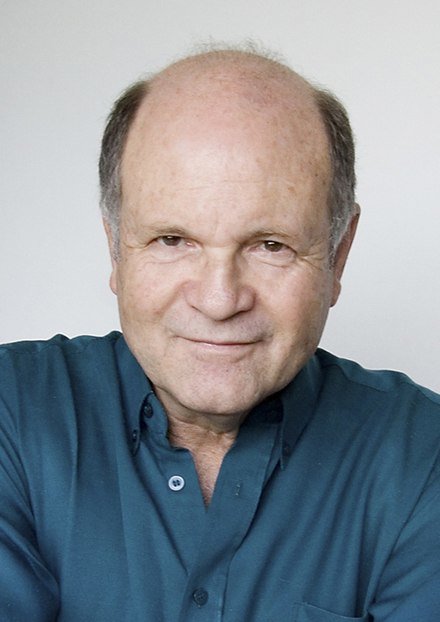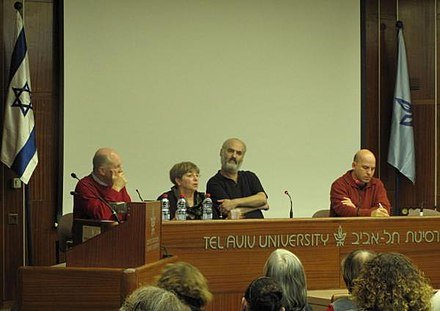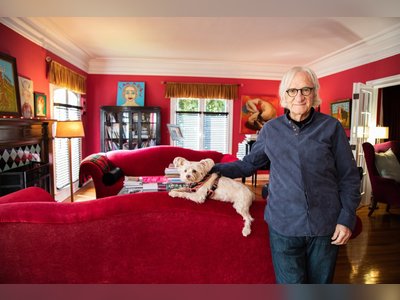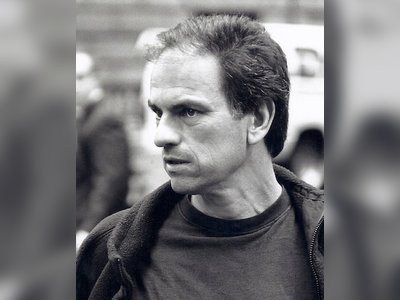מורשת גדולי האומה
בזכותם קיים
beta
Ran Levi
Ran Levi, born on August 1, 1940, in Tel Aviv, is an Israeli director and television producer known for his work in directing both narrative and documentary films. He is also an emeritus professor in the Department of Film and Television at Tel Aviv University and is a recipient of the Israel Prize for Communication.
Biography
Levi was born and raised in Tel Aviv. He grew up in a strongly Zionist, Israeli, Ashkenazi, and northern Tel Aviv environment, attending urban high school. After completing his military service in the Paratroopers Brigade, he pursued studies in economics and political science at the Hebrew University and later attended the London Film School. He was a fellow at Harvard University during the years 1968-1999.
From 1968 to 1999, he worked as a director in the drama department of Israeli television, creating numerous dramas and documentary films. He currently works as an independent filmmaker.
The inspiration for much of Levi's work, which often focuses on marginalized members of society, social disparities, and the Israeli-Palestinian conflict, stems from his childhood experiences and his reflections on the Holocaust:
"The fact that the German people could do what they did made me realize that any society could start doing wrong things to its minority. The fundamental core of hatred for the stranger and the suppression of the stranger develops wherever there is a powerful group with national or nationalist elements, no matter how you define it. The inclination to oppress the downtrodden, for whatever reason, was always present in me. Social issues and inequality among people were also things I felt connected to and compelled to address."
In his debut film, "Ani Achmed" (I Am Achmed) from 1966, directed by Avshalom Katz, Levi already delved into the Palestinian issue and the relationships between Jews and Arabs, with the protagonist being an Arab laborer on his way from the Triangle region to Tel Aviv. One of his most famous works addressing the Palestinian issue is "Khirbet Khizeh," a dramatic film based on S. Yizhar's story that dealt with the eviction of Arab villagers during the War of Independence. The drama was aired on television in 1978, despite controversies and debates.
Levi's documentary film "The Film That Wasn't" (1994) presented testimonies by Arabs who were recruited by the Israeli Shin Bet. Another documentary, "Sakhnin Lives," told the story of the Bnei Sakhnin football club against the backdrop of their victory in the State Cup and allegations of match-fixing.
Levi's works often explored poverty and social disparities in Israel. His most notable creation in this regard is the drama "Lehem" (Bread) from 1986, which portrays a family during a period of social and economic crisis. Another film, "Indian in the Sun" (1981), based on a story by Adam Baruch and a script by Dita Grin, earned Levi the David's Harp Award. The film depicts the meeting between two different worlds: a soldier from northern Tel Aviv and a soldier from a kibbutz of Indian origin.
In 1972, Levi adapted Gideon Telpaz's story "Who and the Roses are Red" for television. It portrays a Jewish family returning to Israel from Egypt during the British Mandate.
Levi also directed theater plays, including "The Bride and the Butterfly Hunter," "The Child Dreams," and "Crown on Top." He also created the series "Mr. Mani" (1996) based on A.B. Yehoshua's book, which chronicles a Jewish family's history over a century.
In 1988, he directed the drama "Playing in Winter" based on Isaac Ben Ner's story, and in 1992, he directed the TV film "Bochah," produced by Channel 1, based on a script by Gilead Evron, who worked closely with playwright Yosef Bar-Yosef, starring Yigal Naor and Shmuel Vilozny.
Levi was awarded the Israel Prize for Communication in 1993 for his body of work.
In 2000, he directed the television series "Murder, Cameras" based on a book by Batya Gur. The series includes a depiction of a case involving prisoners of war from Egypt in Ras Sudar during the Six-Day War, as described to Levi by his comrades in the paratroopers unit.
In 2009, a DVD box set was released containing all of his films in a newly remastered edition.
In 2016, Levi directed the drama series "Late Divorce" based on A.B. Yehoshua's book.
In 2019, he created his first feature film, "The Dead of Jaffa." The drama tells the story of a childless couple, George and Rita, living in Jaffa. Their quiet lives are disrupted when three Palestinian children, orphaned after their mother's death and their father's imprisonment, come to live with them. The screenplay, written by Gilead Evron before his passing, explores the complexities of their relationships. The film was premiered at the Jerusalem Film Festival and released in Israeli theaters on January 30, 2020.
In May 2021, Levi joined the signatories of a letter addressed to the International Criminal Court (ICC) in The Hague regarding Israeli governance in the West Bank and called on the ICC to conduct its own investigation, expressing doubts about the credibility of official Israeli bodies.
Ran Levi's contributions to Israeli film and television have left a lasting impact, particularly in his exploration of social and political issues, as well as his engagement with the Israeli-Palestinian conflict.
Levi was born and raised in Tel Aviv. He grew up in a strongly Zionist, Israeli, Ashkenazi, and northern Tel Aviv environment, attending urban high school. After completing his military service in the Paratroopers Brigade, he pursued studies in economics and political science at the Hebrew University and later attended the London Film School. He was a fellow at Harvard University during the years 1968-1999.
From 1968 to 1999, he worked as a director in the drama department of Israeli television, creating numerous dramas and documentary films. He currently works as an independent filmmaker.
The inspiration for much of Levi's work, which often focuses on marginalized members of society, social disparities, and the Israeli-Palestinian conflict, stems from his childhood experiences and his reflections on the Holocaust:
"The fact that the German people could do what they did made me realize that any society could start doing wrong things to its minority. The fundamental core of hatred for the stranger and the suppression of the stranger develops wherever there is a powerful group with national or nationalist elements, no matter how you define it. The inclination to oppress the downtrodden, for whatever reason, was always present in me. Social issues and inequality among people were also things I felt connected to and compelled to address."
In his debut film, "Ani Achmed" (I Am Achmed) from 1966, directed by Avshalom Katz, Levi already delved into the Palestinian issue and the relationships between Jews and Arabs, with the protagonist being an Arab laborer on his way from the Triangle region to Tel Aviv. One of his most famous works addressing the Palestinian issue is "Khirbet Khizeh," a dramatic film based on S. Yizhar's story that dealt with the eviction of Arab villagers during the War of Independence. The drama was aired on television in 1978, despite controversies and debates.
Levi's documentary film "The Film That Wasn't" (1994) presented testimonies by Arabs who were recruited by the Israeli Shin Bet. Another documentary, "Sakhnin Lives," told the story of the Bnei Sakhnin football club against the backdrop of their victory in the State Cup and allegations of match-fixing.
Levi's works often explored poverty and social disparities in Israel. His most notable creation in this regard is the drama "Lehem" (Bread) from 1986, which portrays a family during a period of social and economic crisis. Another film, "Indian in the Sun" (1981), based on a story by Adam Baruch and a script by Dita Grin, earned Levi the David's Harp Award. The film depicts the meeting between two different worlds: a soldier from northern Tel Aviv and a soldier from a kibbutz of Indian origin.
In 1972, Levi adapted Gideon Telpaz's story "Who and the Roses are Red" for television. It portrays a Jewish family returning to Israel from Egypt during the British Mandate.
Levi also directed theater plays, including "The Bride and the Butterfly Hunter," "The Child Dreams," and "Crown on Top." He also created the series "Mr. Mani" (1996) based on A.B. Yehoshua's book, which chronicles a Jewish family's history over a century.
In 1988, he directed the drama "Playing in Winter" based on Isaac Ben Ner's story, and in 1992, he directed the TV film "Bochah," produced by Channel 1, based on a script by Gilead Evron, who worked closely with playwright Yosef Bar-Yosef, starring Yigal Naor and Shmuel Vilozny.
Levi was awarded the Israel Prize for Communication in 1993 for his body of work.
In 2000, he directed the television series "Murder, Cameras" based on a book by Batya Gur. The series includes a depiction of a case involving prisoners of war from Egypt in Ras Sudar during the Six-Day War, as described to Levi by his comrades in the paratroopers unit.
In 2009, a DVD box set was released containing all of his films in a newly remastered edition.
In 2016, Levi directed the drama series "Late Divorce" based on A.B. Yehoshua's book.
In 2019, he created his first feature film, "The Dead of Jaffa." The drama tells the story of a childless couple, George and Rita, living in Jaffa. Their quiet lives are disrupted when three Palestinian children, orphaned after their mother's death and their father's imprisonment, come to live with them. The screenplay, written by Gilead Evron before his passing, explores the complexities of their relationships. The film was premiered at the Jerusalem Film Festival and released in Israeli theaters on January 30, 2020.
In May 2021, Levi joined the signatories of a letter addressed to the International Criminal Court (ICC) in The Hague regarding Israeli governance in the West Bank and called on the ICC to conduct its own investigation, expressing doubts about the credibility of official Israeli bodies.
Ran Levi's contributions to Israeli film and television have left a lasting impact, particularly in his exploration of social and political issues, as well as his engagement with the Israeli-Palestinian conflict.
- רם לויhe.wikipedia.org



